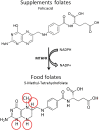Improvement of gamete quality by stimulating and feeding the endogenous antioxidant system: mechanisms, clinical results, insights on gene-environment interactions and the role of diet
- PMID: 27423667
- PMCID: PMC5171888
- DOI: 10.1007/s10815-016-0767-4
Improvement of gamete quality by stimulating and feeding the endogenous antioxidant system: mechanisms, clinical results, insights on gene-environment interactions and the role of diet
Erratum in
-
Erratum to: Improvement of gamete quality by stimulating and feeding the endogenous antioxidant system: mechanisms, clinical results, insights on gene-environment interactions and the role of diet.J Assist Reprod Genet. 2017 Jan;34(1):155. doi: 10.1007/s10815-016-0840-z. J Assist Reprod Genet. 2017. PMID: 27873039 Free PMC article. No abstract available.
Abstract
Oxidative damage triggers extensive repair in gametes and thereafter in the zygote but it results in clinically relevant damage when affecting the maturation of the gametes chromatin, i.e. padlocking and epigenetic marking. It associates with defective DNA methylation and/or with oxidation of the methyl marks leading to derangement of gamete epigenetics, defects of chromatin condensation and aneuploidy. A proper feed to the one carbon cycle has the potential to stimulate the endogenous antioxidant defences, i.e. gluthatione synthesis, and to activate compensative homeostatic mechanisms restoring both the oxy-redox balance and DNA methylation, which are indeed strictly cross-regulated. This has been shown to produce measurable clinical improvements of male reproductive potential in pilot studies herein summarised. However, the effects of dietary habits and of supplementations are variable according to the individual genetic substrate, as genetic variants of several of the concerned enzymes occur with high frequency. Individual risk assessments and personalised interventions are still difficult to implement, in the meantime, a very varied diet may facilitate metabolic compensation in the majority of the cases. This review aims to report on the mechanisms of damage, on the opportunities to modulate the physiologic oxy-redox homeostasis by means of a varied diet or dietary supplements and on the open issues related to the genetic variability of the population.
Keywords: DNA methylation; Epigenesis; Oocyte; Oxidative stress; Sperm.
Conflict of interest statement
MD is R&D Director and shareholder at Parthenogen SAGL, a private company engaged in the development of dietary supplements. The other authors declare that they have no conflict of interest.
Figures





References
Publication types
MeSH terms
Substances
LinkOut - more resources
Full Text Sources
Other Literature Sources
Medical

